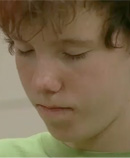|

The Transcendental Meditation Technique is simple and effortless to learn, even for a child with ADHD. And the children settle down easily and naturally, when they meditate.
|
|
by Global Good News staff writer
2 March 2011
According to the Centers for Disease Control, more than four million American children are diagnosed
with Attention Deficit Hyperactivity Disorder (ADHD). Use of psychotropic medications for children
is controversial. PBS television show, To the Contrary, took a look at how Transcendental Meditation,
also known as the TM Technique, is helping some of these children successfully handle ADHD without
medication.
To the Contrary visited Kingsbury Day School in Washington, DC—a school for children with language
base disabilities and ADHD. 'This may seem like your typical middle school classroom, but twice a day
everything comes to a stop. These students aren't napping, they're meditating,' said the host of the show.
The students are practising the Transcendental Meditation Technique for ten minutes, twice a day.
Cuyler, a cherubic youngster with ADHD, said, 'It kind of makes me feel more relaxed and less mad and
angry.'
Another student named Zach said, 'It gives us a break during class so we can rest, and not continue on
with the pressure and stuff. . .'
Researchers are finding that the Transcendental Meditation Technique may do more than just relax the
children—it may actually decrease disabling aspects of ADHD.
'The pairing of a meditation technique known for silence, with a disorder characterized by inattention,
lack of focus, and impaired impulse control may not seem like a practical solution,' commented the
television host. However, she said proponents of the programme cite evidence that the technique’s effect
on a child’s biochemistry parallels ADHD medications, without the side effects.
Sarina Grosswald, EdD, an expert in cognitive learning and director of the TM study at Kingsbury Day
School, said of the students, 'They're having difficulty concentrating and keeping their attention to
start with, and TM is the exact opposite. It doesn't require that they focus or that they control the mind in
any way. So it's a perfect match for students who have difficulty with ADHD or attention, concentration,
that kind of thing.'
Dr Grosswald described the process of Transcendental Meditation as settling down of the mind. 'When
the mind is settled, the body becomes settled and that’s when changes begin to take place.' The deep
rest of TM allows the body to get rid of deep stress, she explained. 'We also see from the research that it
enlivens the brain. That’s unique about TM.'
After three months of practising the Transcendental Meditation Programme, 53 per cent of the Kingsbury
students reported being less anxious and depressed. Twenty six per cent reported an improved ability to
focus.
Hameed, a teenage student, said about the meditation sessions, 'If I've had a bad morning, I can get a lot
of stuff off my mind.'
Whether bringing relief from anxiety and stress, or improving a child’ s ability to focus, the TM Technique
seems to be helping the students at Kingsbury Day School. 'The thing that is the biggest obstacle for that
child is the thing that starts to change the most,' remarked Dr Grosswald.
© Copyright 2011 Global Good News®
|


